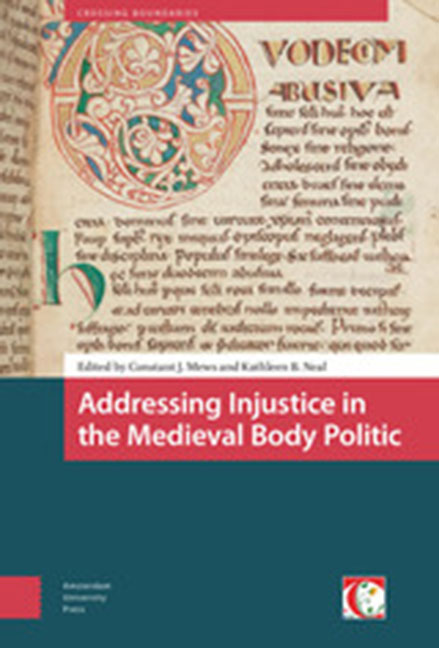Book contents
- Frontmatter
- Contents
- Acknowledgements
- Abbreviations
- Note on References
- List of Tables and Illustrations
- Introduction: Justice and its Abuse in the Medieval Body Politic
- 1 The De XII abusiuis saeculi: Contexts and Textual Traditions
- 2 The Irish Background to the De XII abusiuis saeculi
- 3 ‘Each in the Calling to Which They are Called’: Images of Authority in the De XII abusiuis saeculi
- 4 Transforming Irish Traditions: De XII abusiuis saeculi and Justice in the Frankish World, c. 750–1050
- 5 The Unjust King and the Negligent Bishop: Addressing Injustice in Eleventh and Twelfth-Century England and Germany
- 6 Reflecting on Abuses in Religious Life: From The Twelve Abuses of the Cloister to The Cloister of the Soul
- 7 Preaching the Body Politic: John of Wales and Franciscan Political Thought in the Late Thirteenth Century
- 8 Justice and Its Abuses in the Speculum justiciariorum
- 9 Addressing Abuses and Injustice in the Court of Philip the Fair: The De informatione principum of Durand of Champagne
- 10 ‘Perfect Justice Weighs Everything on a Balanced Scale’: Italian Friars on Equity, the Common Good, and the Commune c. 1270–c. 1310
- 11 Some Late Franciscan Rewritings of the Twelve Abuses
- Appendix: On the Twelve Abuses of the Age A Translation
- Bibliography
- Index of Biblical References
- Index of Manuscripts
- General Index
2 - The Irish Background to the De XII abusiuis saeculi
Published online by Cambridge University Press: 14 February 2024
- Frontmatter
- Contents
- Acknowledgements
- Abbreviations
- Note on References
- List of Tables and Illustrations
- Introduction: Justice and its Abuse in the Medieval Body Politic
- 1 The De XII abusiuis saeculi: Contexts and Textual Traditions
- 2 The Irish Background to the De XII abusiuis saeculi
- 3 ‘Each in the Calling to Which They are Called’: Images of Authority in the De XII abusiuis saeculi
- 4 Transforming Irish Traditions: De XII abusiuis saeculi and Justice in the Frankish World, c. 750–1050
- 5 The Unjust King and the Negligent Bishop: Addressing Injustice in Eleventh and Twelfth-Century England and Germany
- 6 Reflecting on Abuses in Religious Life: From The Twelve Abuses of the Cloister to The Cloister of the Soul
- 7 Preaching the Body Politic: John of Wales and Franciscan Political Thought in the Late Thirteenth Century
- 8 Justice and Its Abuses in the Speculum justiciariorum
- 9 Addressing Abuses and Injustice in the Court of Philip the Fair: The De informatione principum of Durand of Champagne
- 10 ‘Perfect Justice Weighs Everything on a Balanced Scale’: Italian Friars on Equity, the Common Good, and the Commune c. 1270–c. 1310
- 11 Some Late Franciscan Rewritings of the Twelve Abuses
- Appendix: On the Twelve Abuses of the Age A Translation
- Bibliography
- Index of Biblical References
- Index of Manuscripts
- General Index
Summary
Abstract
This chapter examines the Irishness of the De XII abusiuis saeculi. It does so with particular reference to Old Irish legal texts, in particular to the Archaic Old Irish text Audacht Moraind (‘The Testament of Morand’), believed by some scholars to predate even the De duodecim abusiuis (thereby placing it before c. AD 650 and earlier than every other Speculum Principis of the Middle Ages), and to the Senchas Már, the ‘Great Collection’ of early Irish laws. It discusses not just the parallels between DDAS and the legal texts, but the difficult question of which came first. There can be little doubt, however, about its original provenance in seventh-century Ireland.
Keywords: Early Ireland, Old Irish, Brehon law, Audacht Moraind, Senchas Már
The De XII abusiuis saeculi has long been regarded as one of the three most important Irish Latin compositions of the Early Middle Ages. It stands at the apex of Hiberno-Latin learning in the seventh century, along with the De mirabilibus sacrae scripturae [DMSS] of Pseudo-Augustine (dateable to 654/655), and the anonymous Liber de ordine creaturarum—described by the great Charles W. Jones as ‘a work of magnificent conception’—which may be derivative of the De mirabilibus or may have been its source. In the ongoing (and seemingly never-ending) debate about the nature and extent of that Hiberno-Latin learning, those three texts have provided the benchmark against which the writings of later Irish authors, and of Latin writers in England and on the continent, have been measured. Of the three, the DDAS has been adjudged to have exerted the greatest influence, principally for its importance in the development of the concept of the speculum principis. Kenney remarked of it that ‘[t]he section which especially interested … continental students was that discussing the rex iniquus. And it can be said that the unknown Irish author made a real contribution to the development of European political theory’.
- Type
- Chapter
- Information
- Addressing Injustice in the Medieval Body Politic , pp. 71 - 86Publisher: Amsterdam University PressPrint publication year: 2023

